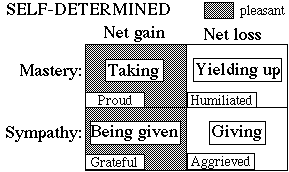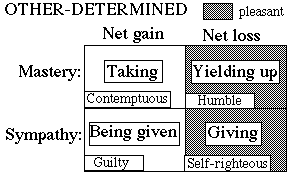Volition
by Peter Shepherd
Reversal theory as described above provides a conceptual framework within which a wide variety of particular motives, emotions and psychological problems have their place and can be understood. However there are others which are not encompassed, and these all have to do with interpersonal relations - for example such emotions as love and hate, gratitude and guilt, devotion and humiliation.
The basic structure of the theory therefore has to be extended. Along with telic and paratelic modes of operation, other motivational states that tend to reverse back and forth are:
- feeling the need to act against as opposed to the need to conform;
- feeling the need for domination or control as opposed to the need for sympathy;
- to be self-determined (acting upon one's own volition) as opposed to other-determined (volition residing in the other person).
In each of these pairs of states, one must be experiencing one or other of the dichotomies at any particular time, and so they are mutually exclusive. The pairs of motivational states, though, are always in place and accompany and interact with each other.
The self concept (such as 'self-esteem') is: the totality of attitudes, judgements and values of an individual relating to his behaviour, abilities and qualities. Such a concept is fairly enduring. In contrast, self feelings or tone (such as 'hedonic tone') are strongly dependent on momentary changes of situation, and therefore tend to be always on the move. For example, one may have low self esteem as a tennis player, but have pleasant self tone on those particular occasions in a game when one wins a point. The feelings involve an immediate sense of personal worth.
The mastery state can be defined as a mode in which pleasant self tone derives from the feeling of being in control. Unpleasant self tone in this mode is associated with feeling incompetent, weak or inferior.
The sympathy state can be defined as a mode in which pleasant self tone derives from the feeling of being liked. Unpleasant self tone in this mode is associated with feeling disliked, uncared for or unattractive.
Mastery and sympathy states differ from each other primarily in the way that the individual interprets the outcome of transactions between himself and the 'other', resulting in a net loss or a net gain:
- In a self-determined (volitional) mastery state a transaction is felt subjectively to involve some degree of either 'taking' (corresponding to a pleasurable gain) or of 'yielding up' under pressure (corresponding to a loss).
- Whereas in a self-determined sympathy state the transaction is felt to involve some degree of either 'being given' (corresponding to a pleasurable gain) or of 'giving under pressure' (corresponding to a loss):

Why is it good to make a net gain? One reason is goal achievement in the telic state (which may of course accompany a mastery or sympathy state) provides the satisfaction of an intended outcome; another is that in the mastery state it can be taken as evidence of personal power, strength and skill, and in the sympathy state as evidence of personal attractiveness. Both ways it enhances self-tone and concomitant feelings of worth
Envy and jealousy arise when another makes a net gain at the expense of oneself. Envy would appear to be a mastery version of this emotion, in which the other person successfully takes or achieves and can therefore be experienced as stronger than oneself. Jealousy occurs in the sympathy state, in which someone is given attention at the expense of oneself and can therefore be experienced as more liked than oneself.

In the self-determined state, the source of self tone is within oneself, the volitional self. But it is also possible for the source or volition of self tone to be transferred to another's identity, i.e. one experiences the tone that the other person appears to be experiencing - one has become 'other-determined'. The other person is angry with me, so I accept that as valid and feel angry with myself; he is angry with others so I am angry with them too. I have identified with the other person.
Yielding-up in the other-determined state is now pleasant rather than unpleasant, e.g. a keen soldier enthusiastically submitting to discipline, and this is true too of giving, e.g. a mother looking after her child with loving tenderness.
| MASTERY | SYMPATHY | |
| Self-determined (Cause) | To master | To sympathise with |
| Other-determined (Effect) | To be mastered | To sympathise |
While the aim of the mastery state in the self-determined version is to master some other person (or object or situation) and thereby to feel strong, in the other-determined state it is to be mastered so that it is the other in whom the volitional self temporarily resides who will feel strong. So paradoxically, one gains by making a net loss in transactions - by submitting one comes to feel strong e.g. a teenager who idolises the leader of a gang to which he belongs.
Similarly, where the aim of the sympathy state in the self-determined case is to be sympathised with, so as to feel liked, in the other-determined case it is to sympathise with some other person so that it is this other person who will feel liked (and therefore one will oneself enjoy the feeling of being liked through identification) e.g. a wife may derive pleasure from being a 'tower of strength' to her husband. This is perhaps the essence of altruism.
To help make this description a little more concrete, there follows a set of examples of situations in which one would probably experience the above motivational states. For simplicity, each example is put in terms of success and would therefore be associated with enhanced self tone. If the outcome was unpleasant then one would be in the other side of the dichotomy.
| MASTERY | SYMPATHY | |
| SELF-DETERMINED: | Profiting from a business transaction Defeating someone in a game Controlling complex equipment Mastering an intellectual problem Giving an employee orders |
Presenting money to a charity Giving a present to a child Taking an interest in someone Tending a garden Buying a friend a drink |
| OTHER-DETERMINED: | Being given a present Having your story listened to at a party Accepting help when in trouble Being cared for when ill Listening to good advice |
Submitting to discipline in the army Displaying solidarity in a trade union Accepting the dogma of a religion Conforming as a musician to a conductor Undergoing demeaning rituals to join |
Taken together, these two matrices display the structure of relationships which underlie eight distinguishable, and contrasting, types of feeling. This can be taken further by incorporating a final dichotomy: negativity as opposed to conforming. This comes into play when unpleasant feelings arise, as follows:
In the self-determined mastery state, if one proves oneself superior, then one is likely to feel proud; if, however, one finishes up in a position of inferiority, one will suffer humiliation to some extent, an unpleasant self tone. Humiliation differs from humility, subordination from submission, subservience from service, in that the former in each case is an undesired impingement on self-determinism, and the latter a desired reflection of other-determined mastery.
In the other-determined version of the mastery mode, then, if one willingly submits to a stronger person then one feels humble, with admiration for the other. If, on the other hand, the other person turns out, exasperatingly, to be weaker than oneself, despite all one's efforts to bolster this person up, then one is likely to feel despairingly contemptuous and disdainful towards them.
In the self-determined sympathy state, one feels grateful for being given sympathy and liked; in contrast, one will feel aggrieved (hurt, affronted, etc.) if one is not given these things, or if one even finishes up by giving them oneself.
In the sympathy state one's feelings towards the other will, in the other-determined case, be ones of solicitousness and tenderness, and if one succeeds in caring and giving, the result will be a pleasant feeling of self-satisfaction, virtue and even self-righteousness. If one fails by not being able to nurture the other, or even by making a net gain from the transaction, then one will feel guilty and ashamed as a result (or experience some sense of obligation) - and this is of course an unpleasant form of self tone.
The mastery and sympathy states can each occur in association with either the telic or paratelic state, so the interaction can be perceived as either serious (telic) or playful (paratelic). For example one may enjoy the humiliation of being tricked or teased provided one stays in the paratelic mode.
At this point the conformist versus negativistic dichotomy comes into the picture. If one of the unpleasant outcomes mentioned above, having been at first accepted in the conformist mode, is continued for too long, frustration may build up and induce the negativistic mode as a rejection of that outcome. Each of the unpleasant emotions will be converted into a rather different emotion by the advent of the negativistic mode:
CONFORMIST
| MASTERY | SYMPATHY | |
| SELF-DETERMINED: | Humiliated | Aggrieved |
| OTHER-DETERMINED: | Contemptuous | Guilty |
NEGATIVISTIC
| MASTERY | SYMPATHY | |
| SELF-DETERMINED: | Defiant | Hating |
| OTHER-DETERMINED: | Self-denigrating or Committed | Self-hating or Devoted |
Thus humiliation becomes defiance, and the feeling of being aggrieved becomes resentment and even hate. One thing that this analysis helps to make clear is that love and hate are sympathy emotions, referring to gratitude or self-satisfaction at having been given, and to the negative reaction to aggrievement at not having been given (such as attention, admiration, stroking); or they may relate to an unselfish giving and self-hatred as a negative reaction if this isn't possible. Similarly the mastery version of love is lust and this can either involve the quest for domination or submission.
In the other-determined state matters are a little more complex in that the negativism may be directed at the other person or against oneself depending on which is seen as the source of the failure. Thus contempt towards someone who fails to dominate oneself can lead to either self-denigration and self-abasement in a desperate attempt to make the other person stronger, or it can lead to a redoubling of effort to 'build up' that person - which can be described as a passionate commitment or loyalty to him or her.
Likewise guilt can lead either to a form of self-hate in which one denies oneself what one has been given, or to a redoubling of one's efforts to give, which can be described as devotion to the other person. Paradoxically, then, commitment and devotion, which generally seem to be 'positive' emotions, emerge from this analysis as 'negative' emotions which derive much of their special strength from the addition of powers of negativism to the situation. If high arousal is generated these will be experienced in the negativistic state with an angry tone. In addition, all of these negative emotions may also be experienced with some pleasure or playfulness if the paratelic state can be maintained.
Move on to Pan-Determinism.
Return to Transforming the Mind - Contents.